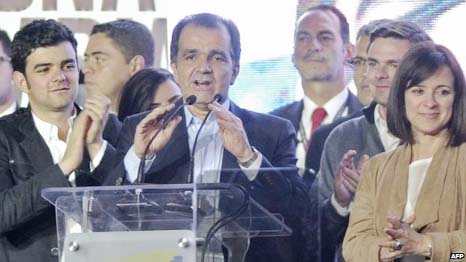
BBC Online :
Juan Manuel Santos, who was re-elected to a second term as Colombian president on Sunday, says he has been given a “mandate for peace” by voters.
Mr Santos campaigned on a promise to drive forward the peace talks he initiated with the country’s largest rebel group, the Farc, in 2012.
He said his election win showed Colombians backed the talks.
More than 220,000 people are estimated to have died in the past five decades of armed conflict.
He told BBC Mundo’s Arturo Wallace that he saw his six-percentage-point win over his conservative rival Oscar Ivan Zuluaga as “a mandate to continue and finish the peace process, which is very important to our country after 50 years of war”.
Mr Zuluaga had said he would impose stricter conditions on the peace talks, threatening to break them off altogether unless the rebels ceased all hostilities immediately.
“I heard very clearly that people wanted peace, and they wanted more social justice, and they wanted more pro-active international relations,” Mr Santos told our correspondent in Bogota a day after his re-election.
He said that the opposition had engaged in “dirty propaganda against the peace process, telling all kinds of lies”. But he said he was confident he could win over those who were sceptic of the talks with Farc.
He said the government had to make an effort to better explain what they were negotiating with the left-wing rebels. The president also stressed that the outcome of the talks would be put to a referendum, in which Colombians “will decide whether to vote for it or not, and this is another safeguard in the process”.
Mr Zuluaga had campaigned under the motto of “peace without impunity”, saying that rebels would have to serve time in jail after they demobilise.
But President Santos said he was convinced that people would “accept a small sacrifice of justice for the sake of peace”.
He said that under a system of transitional justice, rebels who had not committed crimes against humanity would be allowed to do social work instead of jail terms.
Mr Santos said he hoped the election would inject “new momentum” into the peace negotiations so that a deal could be reached by the end of the year.
Rebel and government negotiators have so far achieved agreement on three points of the agenda drawn up in 2012 – land reform, future political participation and drug trafficking, which is allegedly the main source of income for the rebels.
The have yet to reach agreement on the rights of the victims, disarmament of the rebels and the implementation of the agreement.
Our correspondent says that President Santos will face stiff opposition in congress led by former president Alvaro Uribe, who is a fierce critic of the peace process.

